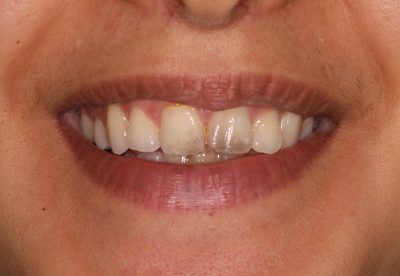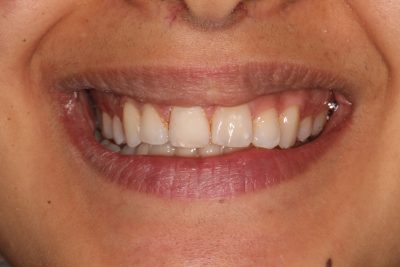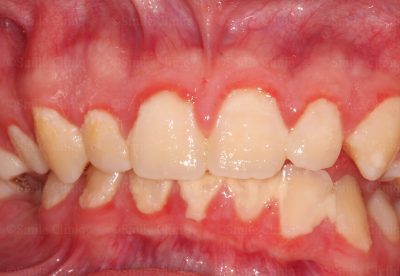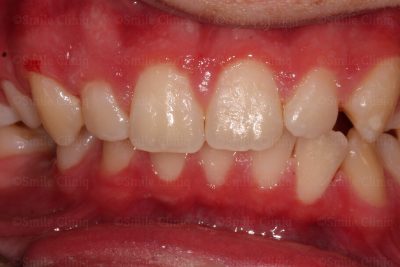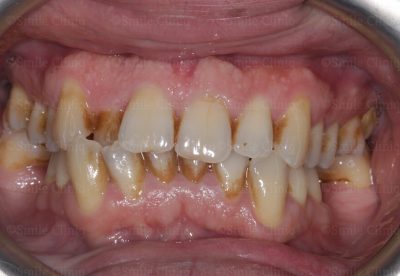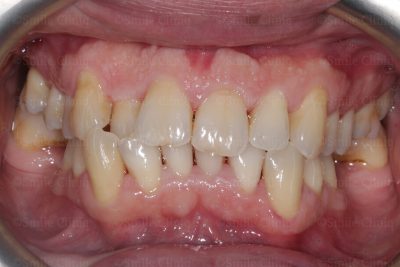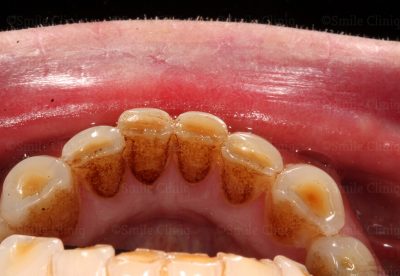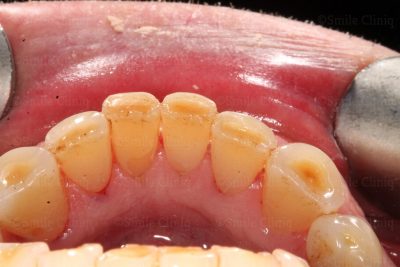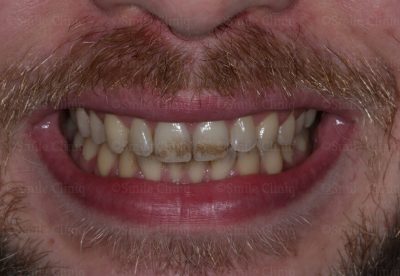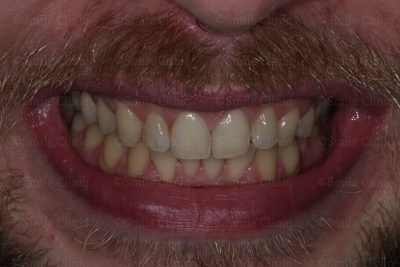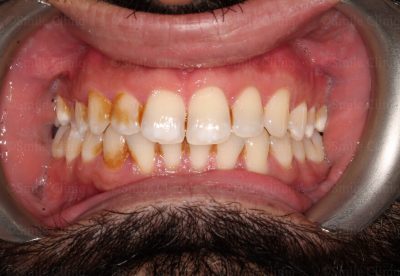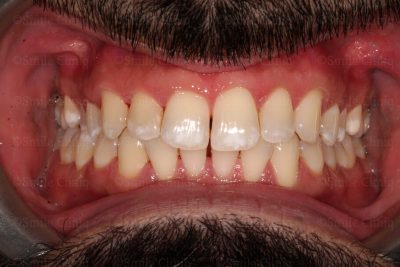Before and After Gallery
Dental Hygienist Treatment In London
Dental Hygiene is the term given to the daily routine of keeping your mouth clean and healthy. You can maintain good oral hygiene by following the correct brushing technique. This also includes flossing, using interdental brushes, rinsing with mouthwash and by seeing your registered dental hygienist regularly. This will ensure your teeth have a professional clean to ensure optimum teeth hygiene.
If a good dental hygiene regime is not followed, the build-up of plaque and tartar can irritate the gums which can lead to gingivitis (gum disease). Additionally, it can also lead to bad breath, unsightly staining, and tooth decay.
In the UK, 54% of the dentate population is affected by some degree of gum disease (Adult Dental Health Survey 2009). This mean that it is essential to have regular dental hygiene treatment to keep your gum and teeth healthy. Regular visits with our hygienist in St Johns Wood or our Finchley branch can help you maintain your oral health and greatly improve the appearance of your teeth.
Signs of Poor Dental Hygiene
- Yellow or discoloured deposits on the teeth
- Persistent bad breath
- Teeth becoming loose
- Gaps in between teeth that were previously not there
- Gums bleeding when brushing teeth
- Painful, red, swollen gums
Why is dental hygiene important?
There are several reasons why you should maintain the highest level of dental hygiene possible. The best dental hygienist in London will be able to you that an array of problems can be caused by poor oral hygiene, some of which includes:
- Gum disease and periodontal disease
- Staining
- Plaque build-up
- Bad breath
- Tooth decay
- Cavities and tooth wear
- Loss of teeth
What Happens At Your Dental Hygiene Appointment?
At your dental hygiene appointment, we will initially carry out a quick screening of your gum and assess the level of tartar and staining. We will then
- Scale your teeth using ultrasonic scaler to gently break off and remove any plaque or tartar build-up in all the areas including hard-to-reach areas where your brushing cannot reach.
- Polish your teeth using special equipment and material to remove any superficial staining on your teeth
- Offer personalised instructions on how you can maintain a good oral health and show you techniques you can benefit from by implementing it in your oral hygiene regime
Please watch a short video demonstration of how scaling is done.
Extra Hygienist Services You May Benefit From Includes:
- Air-flow Therapy ( £55 on top of hygiene treatment)
Used in conjunction with your hygiene treatment to remove more persistent stains and discolouration on your teeth using a combination of high-speed jet water, compressed air and fine powder particles. - Teeth Whitening Treatment (see our fees guide here)
More invasive treatment using medical grade bleach to improve the appearance of your stained or discoloured teeth. The best way find out if you are suitable for a teeth whitening treatment is to book in for an assessment with our cosmetic dentist.


Dental Hygienist London FAQs
How much does an appointment with a London dental hygienist cost?
At Smile Cliniq, we appreciate that different people need different lengths of appointment for a thorough hygiene clean. Our simple scale and polish which involves gum screening, removal of plaque and tartar and polishing for stain removal costs £110.
If you require longer time due to more than moderate build up, you may be suitable for extended hygiene treatment which costs £150 and covers all of the above but gives our dentist more time to scale and polish your teeth thoroughly as needed.
What are the benefits of regular dental hygienist visit?
When you have regular visit with our dental hygienist in Finchley or our St Johns Wood Branch, it can help your dentist monitor the oral cavities frequently to diagnose and treat cavities and other oral issues while the problems are small and easier to fix. Waiting until your tooth is painful usually involves more extensive dental treatment as opposed to catching the problem when it’s small. This can easily be detected by your clinician before it reaches an advanced stage, or before requiring you to see an emergency dentist.
What happens if we don’t remove plaque and tartar?
If we go for long periods of time without removing calculus and plaque build-up, we are at risk of more inflammation and gum (periodontal) disease. The beginning stages of gum disease are reversible, and the gum tissue can heal and reattach to the teeth with proper removal of bacteria and maintenance of a healthy dental hygiene routine. However, if gum disease progresses, permanent bone damage can occur around teeth and more advanced treatments and deep cleanings are necessary to maintain health in such cases.
How does poor dental hygiene cause cavities?
Incorrect brushing techniques and poor oral hygiene can result in the accumulation of plaque on the hard surfaces (enamel) of the teeth. This appears at the margin between the teeth and gums and in between the teeth. If there is no plaque removal this can then calcify into tartar/calculus leading to poor teeth hygiene.
When you eat, the bacteria in the plaque feed on the sugar consumed from food. Over time, acid is produced which corrodes the tooth’s enamel causing decay, holes, and cavities.
How does poor dental hygiene cause gum disease?
The constant accumulation of plaque causes the formation of Tartar / Calculus (hardened plaque) which can be seen on the teeth as hard yellow or brown mineral deposits. Once plaque or tartar starts to form below the gum line, gum disease known as gingivitis can occur. The main signs of gingivitis are inflamed gums and or bleeding of the gums when brushing your teeth or flossing. If Gingivitis is not treated by a registered dental hygienist and is ignored, it can lead to a more advanced form of gum disease known as Periodontitis, in 10% of people. Though this is generally only in those with extremely poor oral hygiene, this can be prevented with regular visits to your registered dental hygienist.
Due to the bacteria in plaque, it causes gums to be irritated and become more inflamed. This results in the gums being separated from the teeth causing periodontal pockets. These pockets allow the tartar and bacteria to spread under the gum line which can lead to further inflammation and destruction of the tissues supporting the teeth. Once the bone is lost, you will start to see your gums recede and the teeth can become loose and mobile – eventually resulting in tooth loss.
Please see here for information on the correct oral hygiene techniques. Feel free to contact one of our team to book an appointment with the best dental hygienist London.
- Please click here for our fees guide.
- Please click here for examples of our work
- For further details of our techniques, materials and techniques please click here.
- Please click here for our guide to maintaining your oral hygiene.
- Interest free payment options are available
- Return to the top of the page










Finchley
020 3582 8621
St Johns Wood
020 3627 8732
Smile Cliniq Limited. A company registered in England and Wales. Company number 08279068.
Registered office: C/O TG Associates 7 Jardine House, Harrovian Business Village, Bessborough Road, Harrow, Middlesex, HA1 3EX
Terms of Use | Privacy Policy | Health & Safety Charter | Complaints procedure | Data Protection | Cookie Settings
Website by Digimax Dental









